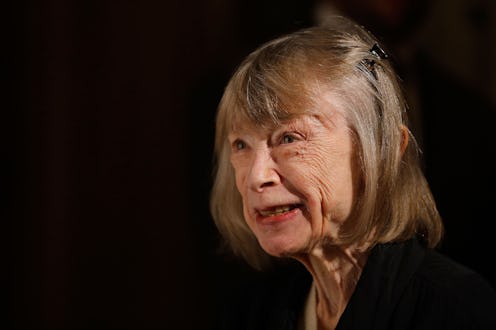Books
11 Joan Didion Quotes Every Writer Should Know
The most famous of Joan Didion’s quotes is probably “we tell ourselves stories in order to live,” which is from from The White Album. Any writer knows this to be true. From an early age, writing was always something Joan Didion knew she wanted to do. According to Tracy Daugherty’s new biography of the writer, The Last Love Song, Didion began keeping notebooks around the age of 6. At 12, she discovered Hemingway. “She read the first paragraph of A Farewell to Arms. She took the book home and typed the first paragraph on a solid Olivetti Lettera 22 typewriter.” By the time she’d made it to Mademoiselle as their guest fiction editor when she was 21, her profile in their August issue read that her interests included “publishing a book of my own.” (She would indeed publish her first novel, Run River, in 1963.)
But even for Joan Didion, the ultimate “cool girl” of literary fame, writing was a struggle. Though it might seem like Didion is a natural, even an “sacred” writer who came out of the womb being praised and coddled, this isn't exactly the case. Didion suffered from a lack of confidence when it came to writing — at times, her anxiety was so intense that it manifested in debilitating migraines, according to Daugherty. In the book, she describes being unable to sleep the night before a piece was published, for fear of response, for fear of getting it right.
For those familiar with the difficult art of writing, let’s take a look at some of Didion’s best quotes on overcoming writer’s block, self-doubt, and more.
On Beginning
"What's so hard about that first sentence is that you're stuck with it. Everything else is going to flow out of that sentence. And by the time you've laid down the first two sentences, your options are all gone." —The Art of Fiction, No. 71, The Paris Review, 1978
On Revising (And Drinking)
"Before I start to write, the night before — I mean, when I finish work at the end of the day, I go over the pages, the page that I’ve done that day, and I mark it up. And I mark it up and leave it until the morning, and then I make the corrections in the morning, which gives me a way to start the day ... I can have a drink at night. And the drink loosens me up enough to actually mark it up, you know. While you’ll just kind of be tense and not sure. Marking up something is just another way of saying editing it. Because you don’t edit very dramatically when you’re — you’re not very hard on yourself, you’re not very loose with yourself most of the day. Really, I have found the drink actually helps.” —Live at the NYPL with Sloane Crosley
On Writing Being "Hostile"
"In many ways writing is the act of saying I, of imposing oneself upon other people, of saying listen to me, see it my way, change your mind. It’s an aggressive, even a hostile act. You can disguise its qualifiers and tentative subjunctives, with ellipses and evasions — with the whole manner of intimating rather than claiming, of alluding rather than stating — but there’s no getting around the fact that setting words on paper is the tactic of a secret bully, an invasion, an imposition of the writer’s sensibility on the reader’s most private space." —"Why I Write," The New York Times Magazine, 1976
"[Writing is] hostile in that you're trying to make somebody see something the way you see it, trying to impose your idea, your picture. It's hostile to try to wrench around someone else's mind that way. Quite often you want to tell somebody your dream, your nightmare. Well, nobody wants to hear about someone else's dream, good or bad; nobody wants to walk around with it. The writer is always tricking the reader into listening to the dream." —The Art of Fiction, No. 71, The Paris Review, 1978
On Journalism
"My only advantage as a reporter is that I am so physically small, so temperamentally unobtrusive, and so neurotically inarticulate that people tend to forget that my presence runs counter to their best interests. And it always does." —Slouching Towards Bethlehem
"Writers are always selling somebody out." —Slouching Towards Bethlehem
On Self-Respect
“I think we are well advised to keep on nodding terms with the people we used to be, whether we find them attractive company or not. Otherwise they turn up unannounced and surprise us, come hammering on the mind's door at 4 a.m. of a bad night and demand to know who deserted them, who betrayed them, who is going to make amends.” —Slouching Towards Bethlehem
“To have that sense of one’s intrinsic worth which constitutes self-respect is potentially to have everything: the ability to discriminate, to love, and to remain indifferent.” —Slouching Towards Bethlehem
On Fiction
"Novels are like paintings, specifically watercolors. Every stroke you put down you have to go with. Of course you can rewrite, but the original strokes are still there in the texture of the thing." —The Art of Nonfiction, No. 1, The Paris Review, 2006
"Let me tell you one thing about why writers write: had I known the answer to any of these questions I would never have needed to write a novel." - "Why I Write," The New York Times Magazine, 1976
On Why She Writes
"I write entirely to find out what I'm thinking, what I'm looking at, what I see and what it means. What I want and what I fear." —"Why I Write," The New York Times Magazine, 1976
